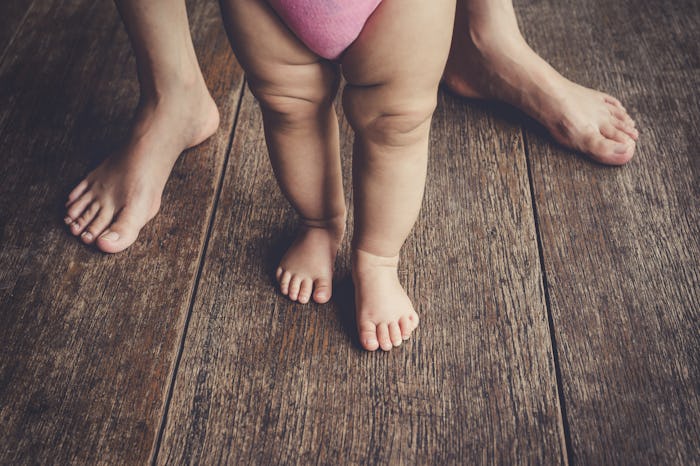Life
Infants Can Practice Walking At 10 Weeks Old, But That Doesn't Mean They Should
No matter how much you may want to try to be in the moment and enjoy every aspect of new parenthood while you can, it's often easy to get caught up worrying about milestones, and whether your baby is developing as they should be. When should they be smiling? Sitting up? Crawling? It seems only natural that parents would want to give their infants as much of an advantage as possible, so a new study showing that infants can begin practicing walking at only 10 weeks old might seem particularly eye-opening for eager moms and dads. But there's no need to panic if infant walking practice hasn't been on your new-mom radar — it definitely isn't something that will make or break your child's motor development.
Researchers at Lancaster University looked at "reflex walking," a form of walking-like movement that involuntarily occurs in young babies as a result of the stepping reflex, according to Science Daily. That is, in the same way that infants will grasp onto your finger if you offer it up, or start rooting for food if you stroke their cheeks, babies held slightly forward with their feet placed flat on the floor "will reflexively walk by placing one foot in front of the other" up until they are about 12 weeks old.
The existence of the stepping reflex is certainly not a new discovery, but the researchers did find that the early walking reflex can actually affect a child's perception of walking long before they actually begin doing it. In the British study, 10-week-old infants were divided into two groups: one that was allowed to experience reflex walking, and one that wasn't. The babies and their mothers then watched a film that showed "human figures walking and crawling," while researchers measured the babies' brain responses. What they found was that the babies who had reflex walked showed signs of recognizing the walking movement shown in the video, in a similar way to older children who are actually learning to walk.
In other words, the physical experience of taking steps — even involuntary ones — influenced the way the infants were actually able to perceive walking in a way that babies who hadn't taken steps weren't. But that doesn't mean we should all be making our tiny infants reflex walk to help them learn to walk later on: the study didn't actually suggest that reflex walking had a direct effect on intentional walking, but just that there may be "a link between action perception and action production" in very young children. But even if it did, it seems that it still might not be necessary for parents to specifically encourage their babies to walk as soon as possible anyway.
As much as we might want our children to walk early — whether because we think that means they are completely brilliant and advanced, or because we're just eager to see them plodding around — it sounds like it doesn't make much of a difference long-term. In 2013, researchers at The Zurich Children’s Hospital found that there is "little or no link between such early ‘motor milestones’ and later development," according to The Daily Mail, with the researchers concluding that "children who start walking early turn out to be neither more intelligent nor well co-ordinated" than those who don't.
If there likely isn't any real benefit to having a baby who walks earlier than their peers, then trying to teach your baby to walk before they may be ready probably isn't necessary. But some parenting approaches advise against it entirely, suggesting it could do more harm than good.
Although many parents might enjoy holding their young kids up and "walking" them (there are also a number of products on the market made specifically for this), author and RIE parenting educator Janet Lansbury argues that, actually, it might not be such a great idea. In an article on her blog, where Lansbury offers parenting advice based in the RIE principles of respecting infants' autonomy and trusting them to guide their own interaction with the world around them, she writes that while "walking" a baby might not necessarily affect them physically, it can have unintended effects, such a restricting their movement and discouraging body awareness.
Similarly, parents who attempt to encourage walking-like movements through the use of ExerSaucers or doorway jumpers might unknowingly be doing their kids a disservice: in an article for children's health website Dr. Dina, occupational therapist Lauren Hershfield wrote that the devices can actually affect a child's muscle development and sense of balance if they spend too much time in them.
According to BabyCenter, most babies will be taking their first steps anywhere from 9 months to 15 months of age. But children who walk later aren't necessarily delayed: children develop at different rates, and may not always fall in the typical range. Since being slow to walk could indicate a developmental concern though, BabyCenter recommends that parents check in with their doctor if they have a child who isn't standing with support at 12 months, if they can't walk at 18 months, or if they aren't walking steadily by the time they turn 2.
In most cases, children who are able to walk will eventually do so, and focused parental instruction won't be necessary. Of course, there's nothing wrong with offering up lots of love and encouragement, but for now, it seems safe to say that no new parent should have to worry if they haven't begun teaching their tiny infant to take a few steps.
Check out Romper's new video series, Romper's Doula Diaries:
Watch full episodes of Romper's Doula Diaries on Facebook Watch.
